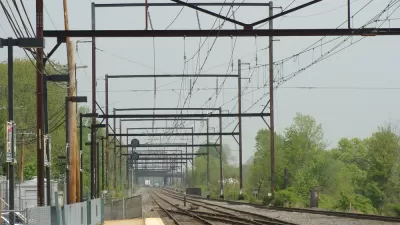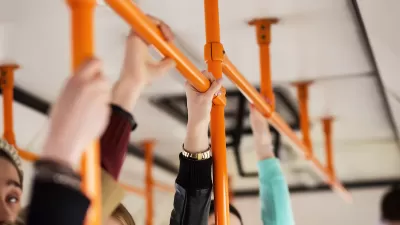As ridership revenues drop, more agencies are looking to diversify their income sources by leasing agency-owned land to developers.

With ridership "plummeting" during the pandemic, cash-strapped transit agencies are turning to leasing real estate to recover lost revenue, reports Jenni Bergal. "Many large transit agencies already have their own real estate departments and for years have been leasing property—often parking lots near rail stations—to development companies," with rent subsidizing operations and maintenance. Encouraging transit-oriented development near stations is "seen as a way not only to create a long-term revenue stream, but also to increase ridership, minimize traffic congestion and help communities by providing jobs and housing, some of it affordable, near transit."
"Agencies have been experimenting with scrapping or reducing fares or adding service to bring back riders and ensure access for disadvantaged communities. During the pandemic, the majority of people who continued to ride buses and trains were essential workers with low incomes, often people of color." The shift toward cheaper or free fares, along with the precipitous fall in ridership caused by the pandemic, has "prompted many transit agencies to look at various ways to diversify their funding beyond relying on fareboxes and federal, state and local dollars."
"[S]ome transit agencies that have gotten into the real estate business are trying to develop affordable housing projects. They often lease to private developers, but sometimes they work with nonprofits, community groups or local governments." Jessie O'Malley Solis, an agency program manager for the Santa Clara Valley Transportation Authority, says "transit-oriented development offers the agency the opportunity to fund normal operations as well as service improvements and enhancements" that will prove solid investments in the system's future.
FULL STORY: Transit Agencies Lease Real Estate to Generate Much-Needed Cash

Alabama: Trump Terminates Settlements for Black Communities Harmed By Raw Sewage
Trump deemed the landmark civil rights agreement “illegal DEI and environmental justice policy.”

Study: Maui’s Plan to Convert Vacation Rentals to Long-Term Housing Could Cause Nearly $1 Billion Economic Loss
The plan would reduce visitor accommodation by 25% resulting in 1,900 jobs lost.

Planetizen Federal Action Tracker
A weekly monitor of how Trump’s orders and actions are impacting planners and planning in America.

Waymo Gets Permission to Map SF’s Market Street
If allowed to operate on the traffic-restricted street, Waymo’s autonomous taxis would have a leg up over ride-hailing competitors — and counter the city’s efforts to grow bike and pedestrian on the thoroughfare.

Parklet Symposium Highlights the Success of Shared Spaces
Parklets got a boost during the Covid-19 pandemic, when the concept was translated to outdoor dining programs that offered restaurants a lifeline during the shutdown.

Federal Homelessness Agency Places Entire Staff on Leave
The U.S. Interagency Council on Homelessness is the only federal agency dedicated to preventing and ending homelessness.
Urban Design for Planners 1: Software Tools
This six-course series explores essential urban design concepts using open source software and equips planners with the tools they need to participate fully in the urban design process.
Planning for Universal Design
Learn the tools for implementing Universal Design in planning regulations.
Caltrans
Smith Gee Studio
Institute for Housing and Urban Development Studies (IHS)
City of Grandview
Harvard GSD Executive Education
Toledo-Lucas County Plan Commissions
Salt Lake City
NYU Wagner Graduate School of Public Service





























